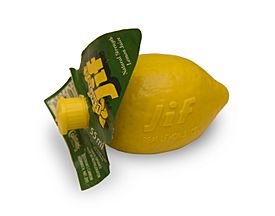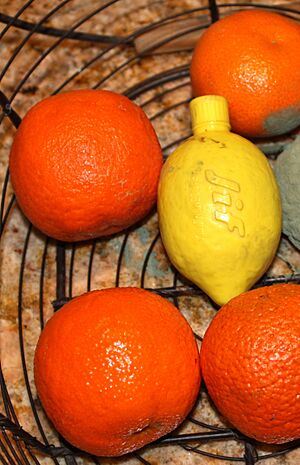Jif (lemon juice) facts for kids

A Jif lemon with the label attached
|
|
| Owner | Unilever |
|---|---|
| Introduced | 1956 |
| Markets | United Kingdom and Ireland |
| Previous owners | Reckitt and Colman |
Jif is a popular brand of lemon juice sold in the United Kingdom and Ireland. It's made from concentrated lemon juice mixed with water. People use Jif to add a lemony taste to their food, like in cooking or as a topping. Just two tablespoons of Jif are like the juice from one fresh lemon. It can stay fresh for about six months.
Jif juice comes in special lemon-shaped squeeze bottles and also in regular bottles. The idea for the plastic lemon-shaped bottle started in the 1950s. It was one of the first food products to use this type of plastic container. The Jif brand of lemon juice began in 1956.
In the 1980s, a company from the US called Borden started selling lemon juice in a similar lemon-shaped bottle in the UK. The company that owned Jif, Reckitt & Colman, sued Borden. They said Borden was trying to make people think their product was Jif. The case was settled in 1990, with Reckitt & Colman winning.
Jif is often used on pancakes, especially for Shrove Tuesday. From 1985, Jif was advertised with the catchy phrase: "Don't forget the pancakes on Jif Lemon Day."
Contents
What's in Jif Lemon Juice?
| Nutritional value per 5 ml | |
|---|---|
| Energy | 1 kcal (4.2 kJ) |
|
0.1 g
|
|
|
Source:
|
|
| †Percentages estimated using US recommendations for adults. | |
Jif is made from lemon juice concentrate and water. It's designed to be as strong as natural lemons. The concentrate is simply mixed with water to make the juice. Jif also contains a food preservative called E223 (sodium metabisulphite) to keep it fresh. This helps the juice last for about six months. Remember, two tablespoons of Jif are equal to the juice from one whole lemon.
Nutrition Facts
A small serving of Jif, about 5 ml (which is like one teaspoon), gives you 1 kilocalorie of energy. It also contains 0.1 grams of carbohydrates.
How to Use Jif Juice
Jif is a great way to add lemon flavour to many dishes. You can use it as an ingredient when you're cooking or as a topping. It's very popular on pancakes, especially on Shrove Tuesday. You can also use Jif to add a zesty taste to salads, sauces, fish, and seafood. It's perfect for any recipe that asks for lemon juice.
Jif's Special Packaging
Besides its famous plastic, lemon-shaped containers, Jif lemon juice is also sold in regular bottles. The lemon-shaped containers usually hold 55 ml of juice. These are often called "jiffy lemons" or "jif lemons." You can squeeze the plastic container to release the juice from its nozzle. When Jif first started in 1956, the plastic containers had the name "Jif" pressed into them. Today, Jif squeeze packs have "Jif real lemon juice" embossed on the side.
The first Jif plastic containers were made from a type of plastic called polythene. They were among the very first blow-moulded containers used for food. These plastic containers replaced the old glass bottles that lemon juice used to come in.
The idea for the plastic lemon container came from a person named Edward Hack. The design of the container was created by Bill Pugh, who was a top plastics designer at a company called Cascelloid. To make the container look so real, Pugh carved a wooden shape, covered it with real lemon peel to get the right texture, and then made a plaster mould from it. This is how the very realistic lemon-shaped bottle was created. Some people say that similar plastic lemon packaging was already around in Italy after World War II, even before the design was made in the UK.
The Story of Jif
Early Lemon Juice Brands
Edward Hack first thought of putting lemon juice into lemon-shaped and coloured packaging in the 1950s. The company Cascelloid Ltd. then designed and made the product. Hack gave Cascelloid a fresh lemon he bought to help them create the plastic container. He had looked at many lemons to find the perfect one!
A designer named Bill Pugh, who was a former Royal Air Force pilot, created a prototype (an early model) of the blown lemon-shaped plastic container based on Hack's idea. This plastic lemon product was first used for a brand called Hax lemon juice. Hax lemon juice was sold in these squeezable plastic lemons, each holding two ounces of lemon juice from Sicily. The juice was pure, had no added water, and included a preservative to keep it fresh.
Another person, Stanley Wagner, who was also a former Royal Air Force pilot, independently developed a similar plastic lemon container. His company, Coldcrops, Ltd., made a product called Realemon. This brand was later renamed ReaLem. Hax lemon juice was the first to be sold in the lemon-shaped container, with Coldcrops following soon after.
Between mid-1955 and early 1956, Coldcrops sold over six million of their plastic juice lemons. They first used the name "Realemon," but then changed it to "ReaLem" with the slogan "juice in a jiffy." This change happened because of a concern that Coldcrops might be trying to copy the Realemon brand from the United States. After some discussions, the two companies agreed not to compete directly. Coldcrops took over the rights to market plastic lemons under the ReaLem brand.
The Jif Brand is Born
The company Reckitt and Colman bought Coldcrops from Stanley Wagner. After a long talk, the deal was made in 1956. This deal transferred the ownership of the special packaging and the idea from Coldcrops to Reckitt & Colman. The new Jif-brand lemon juice was then launched in 1956. Everyone was happy: Stanley Wagner got a good amount of money, and Reckitt's was pleased because they got the business for less than they were prepared to pay. Lemon farmers in Sicily were also happy because the demand for their lemon juice, which was often a leftover from making lemon oil, greatly increased. For many years, they didn't have much use for the juice, but now there was a growing market for it. In 1970, Jif was still made with lemon juice from Sicily. Later, in 1995, Unilever bought the Jif brand for £250 million when they purchased Colman's of Norwich.
When Jif first launched in 1956, its slogan was "Real lemon juice in a Jif." At that time, Jif was the only brand of lemon juice sold in a squeeze pack container in the United Kingdom.
Jif's Competitors
In 1962, a US company called Borden bought the rights to the ReaLemon brand of lemon juice in the United States. ReaLemon had started making juice in the US in the 1930s.
By 1975, ReaLemon was selling well in Europe. Borden then expanded into the United Kingdom market, selling a 250 ml bottle of lemon juice. By 1980, ReaLemon had about 25% of the UK lemon juice market. To compete, Reckitt & Colman started selling Jif in 150 ml and 250 ml bottles too.
Then, Borden planned to sell ReaLemon in a lemon-shaped package, very similar to Jif's. This led to a lawsuit where Reckitt & Colman sued Borden. They argued that ReaLemon was trying to copy Jif's packaging to trick customers into thinking it was Jif.
This case became famous as "The Jif Lemon case." It was settled in 1990. The court decided that Jif's packaging was so well-known that it had a strong reputation. The ruling stated that customers would likely think the ReaLemon was a Jif Lemon if they saw it in a supermarket. Reckitt & Colman won the case, even though they hadn't officially registered the plastic lemon packaging as their own design.
Jif's Marketing and Pancakes
Jif is often used on pancakes. An advertising campaign created the famous phrase: "Don't forget the pancakes on Jif lemon day." This refers to Shrove Tuesday, which is also known as Pancake Day. This campaign helped link Jif lemon juice with eating pancakes on Shrove Tuesday in people's minds. Jif and pancakes are a very popular combination on this day.
In 2000, to meet the high demand for Pancake Day, over 80,000 Jif lemons were produced every day, starting five weeks before the day itself. This happened even though fresh lemons were more available at that time of year. These adverts were shown on television in Ireland and the United Kingdom throughout the 1970s, 1980s, and 1990s.
See also
- ReaLemon
- Cif
 | James B. Knighten |
 | Azellia White |
 | Willa Brown |


